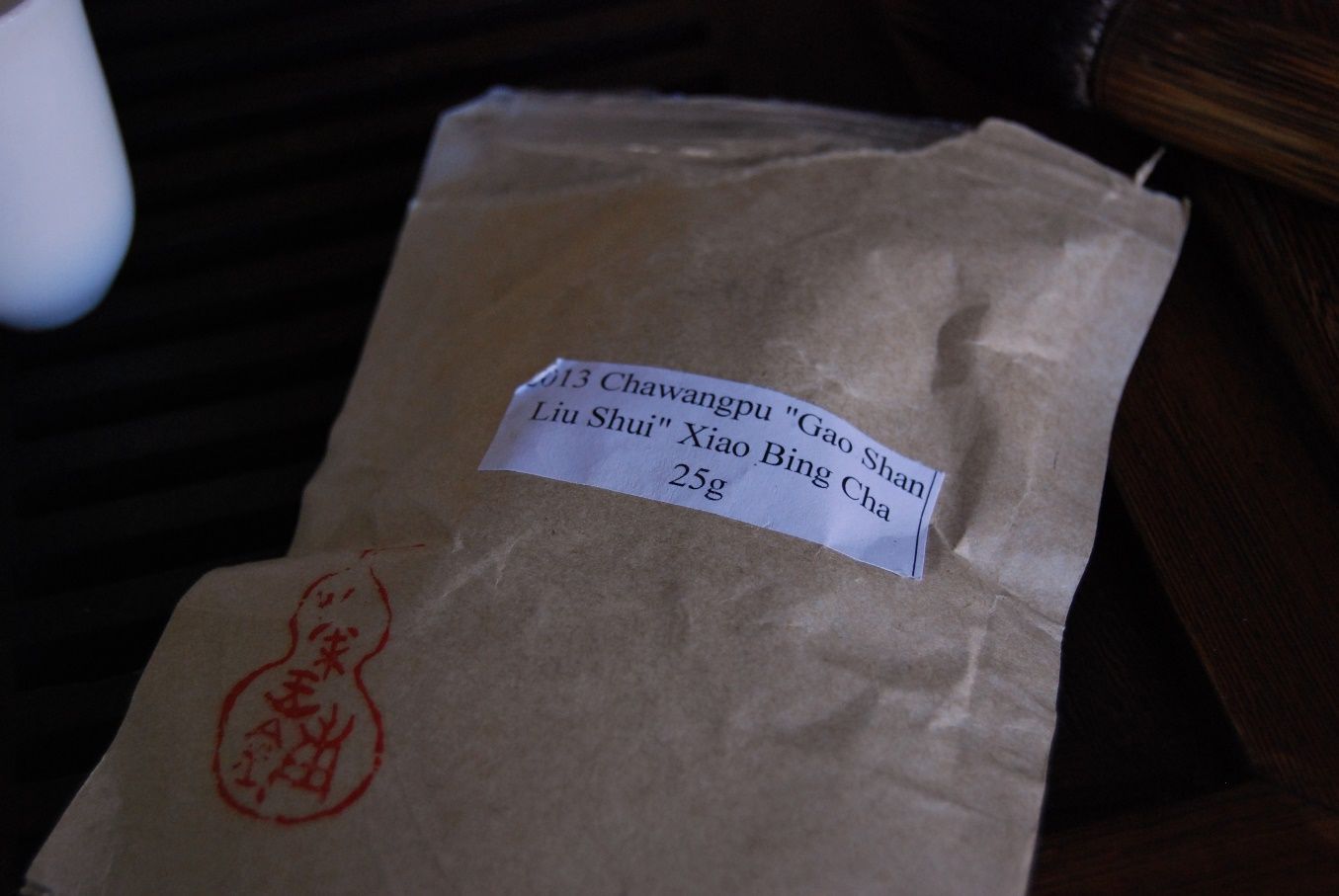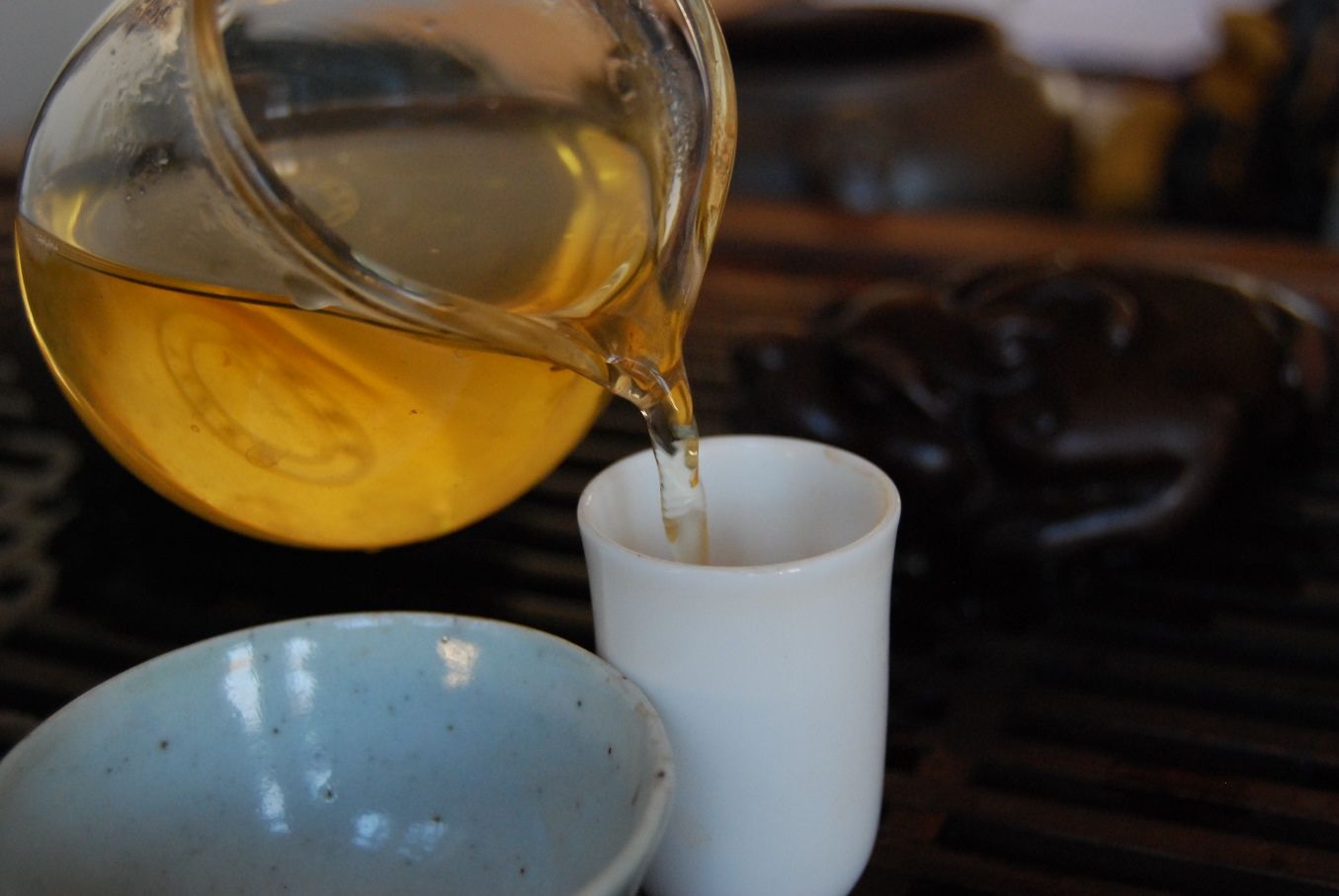I come across the phrase "Gaoshan Liushui" [gow-shan, leo-shway] regularly in my life; as the title of this article suggests, it is usually translated as "High Mountain, Flowing Water" (or stream, or rivulet, according to the poesy of the translator).
I first came across it in a framed piece of calligraphy made by my father-in-law, a military type who (in that uniquely Chinese manner) combines a military and governmental career with being really rather good at classical calligraphy. The piece adorned the wall of her flat when we first met, and has travelled with us ever since.
I first came across it in a framed piece of calligraphy made by my father-in-law, a military type who (in that uniquely Chinese manner) combines a military and governmental career with being really rather good at classical calligraphy. The piece adorned the wall of her flat when we first met, and has travelled with us ever since.
I later encountered it when Stephane of Teamasters (fear the Masters of Tea!) very kindly sent me a CD of classical Chinese music, played on a wide, stringed zither-like instrument called a guzheng. In fact, we have a huge version of such an instrument in the house right now. The CD introduced me to the classical guzheng piece of the same name, "Gaoshan Liushui" - it is beautiful indeed, and I recommend Googling or Youtube'ing it.
There are several versions of a similar story underlying the name. A certain "Boya" (circa 240 BC) was a guqin player in the Zhou Dynasty, and found in Zhong Ziqi, a simple man, often portrayed as a woodcutter, who could appreciate his music. As told in the Liezi (known as Lieh Tsu to most English schoolchildren), a guqin player should play only if he can find someone able to appreciate his music. In Zhong Ziqi, the appreciation came from the most humble type of man, hinting at the Daoist notion that virtue can (and perhaps solely does) exist in the uncluttered mind, and the simple state.
How that relates to this 2013 tea from Chawangshop, I am not sure. The phrase often means, in common parlence, something like "high and rarified things often have no-one to appreciate them", which is a subtle distortion of Lieh Tsu's actual message, but a usual one nonetheless.
There are several versions of a similar story underlying the name. A certain "Boya" (circa 240 BC) was a guqin player in the Zhou Dynasty, and found in Zhong Ziqi, a simple man, often portrayed as a woodcutter, who could appreciate his music. As told in the Liezi (known as Lieh Tsu to most English schoolchildren), a guqin player should play only if he can find someone able to appreciate his music. In Zhong Ziqi, the appreciation came from the most humble type of man, hinting at the Daoist notion that virtue can (and perhaps solely does) exist in the uncluttered mind, and the simple state.
How that relates to this 2013 tea from Chawangshop, I am not sure. The phrase often means, in common parlence, something like "high and rarified things often have no-one to appreciate them", which is a subtle distortion of Lieh Tsu's actual message, but a usual one nonetheless.
Selecting such a name is dangerous: you are saying that this cake is rarified and fine, perhaps possessing the highest state of virtue, and that its appreciation is not guaranteed, except by those humble and perceptive souls who are receptive of its qualities. This is a very hard act to follow, and, in a cake that is just $28/200g, we suspect that they may have "over-egged the pudding" in choosing a name of such grandeur.
The actual cake, would you believe it?, is more down-to-earth. It is fresh, zesty, and sweet - perhaps a touch watery in the mouth at the beginning. It builds to a decent finish in the throat, and has a good balance between kuwei [good bitterness], texture, and basic pu'ercha characteristics. In later infusions, the texture thickens nicely.
My notes have "there are few cakes that can delivery such characteristics at such an affordable price, and, for the first time in a long while, I am considering whether or not to buy a tong of these xiaobing". I later dwelled on the decision and concluded "it is certainly good value, and would make a good addition to a new collection - but possibly not our collection".
Perhaps it did live up to its name, in a way, after all. With thanks to JT for the session.
My notes have "there are few cakes that can delivery such characteristics at such an affordable price, and, for the first time in a long while, I am considering whether or not to buy a tong of these xiaobing". I later dwelled on the decision and concluded "it is certainly good value, and would make a good addition to a new collection - but possibly not our collection".
Perhaps it did live up to its name, in a way, after all. With thanks to JT for the session.




No comments:
Post a Comment